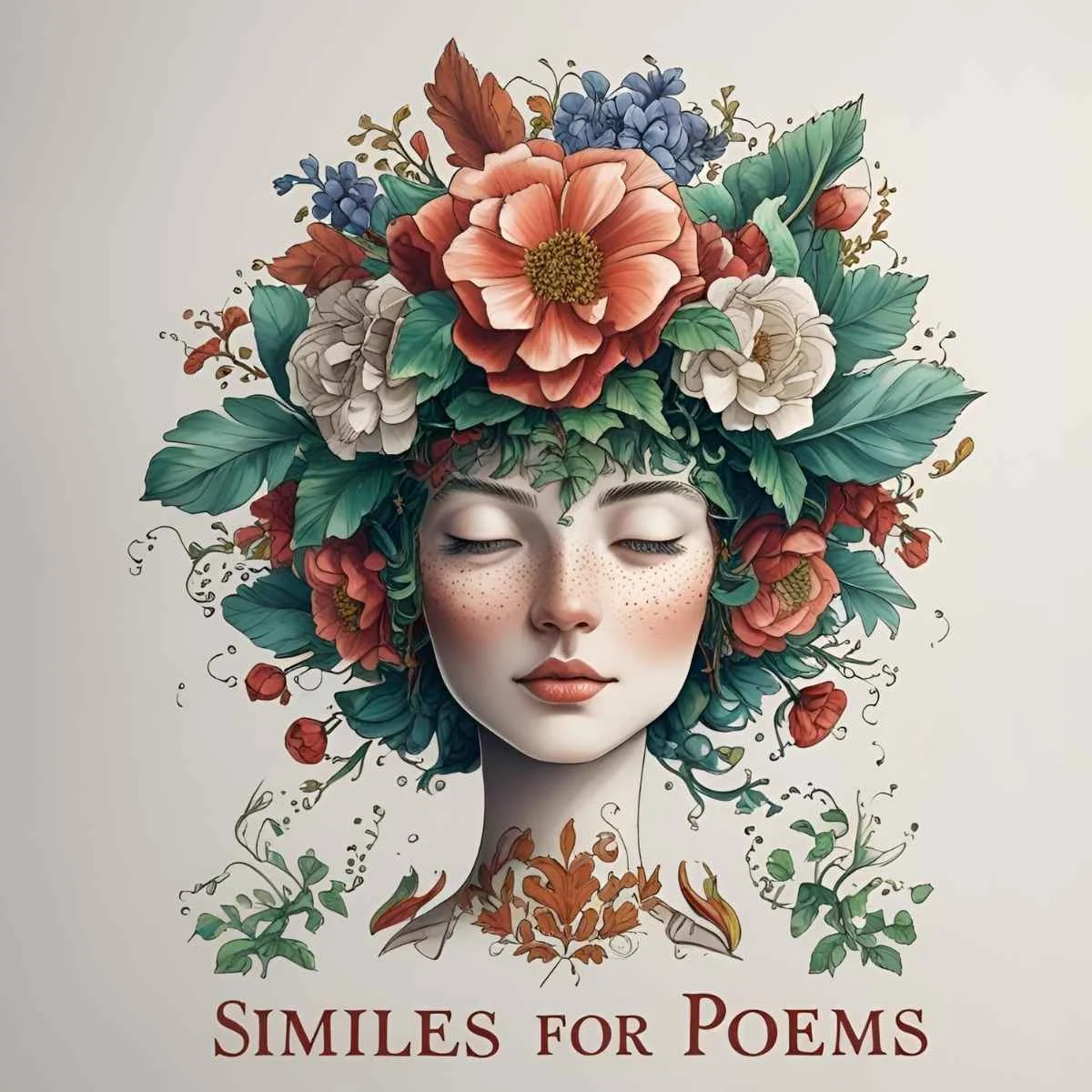The Enchantment of Similes in Poetry 🌟
Similes are like stars in a poet’s sky, twinkling with comparisons that use “like” or “as” to illuminate ideas and emotions.
They transform simple lines into vivid tapestries, making poetry resonate with readers’ hearts. Instead of “This poem is moving,” try “This poem flows like a river, carrying emotions to new shores.”
Similes infuse poems with imagery, depth, and relatability, whether in classic sonnets, modern free verse, or spoken word. They’re the spark that makes words dance.
Ever felt a poem linger in your soul because of a perfect simile? Let’s explore 25 similes for poems, grouped thematically, to inspire your own lyrical creations! 📜
Similes for Poems: 25 Lyrical Comparisons
These 25 similes capture the essence of poems—how they evoke emotions, paint images, or bridge cultures. Each includes a meaning, a contextual example, and a specific application for writing, performing, or teaching poetry. Organized into thematic categories, they go beyond surface descriptions to explore poems as emotional, structural, or cultural entities.
Poems as Emotional Currents 🌊
Similes for poems that stir feelings and connect hearts.
- Poems flow like rivers, carving paths through the heart.
Meaning: Poems guide emotions smoothly yet powerfully, like rivers shape landscapes.
Example: In a love poem, “Her words flowed like a river, etching love into my soul’s valleys.”
Application: Use in romantic poetry or a journal entry, e.g., “My poem flows like a river, pouring grief into lines.” - Poems burn like candles, glowing with quiet passion.
Meaning: Poems radiate intense emotion softly, like candles light a room.
Example: In a reflective piece, “His poem burned like a candle, casting hope over despair.”
Application: Perfect for introspective poetry or a speech about art’s emotional power. - Poems dance like embers, sparking fleeting joys.
Meaning: Poems ignite brief, vivid emotions, like embers flare in a fire.
Example: In a spoken word performance, “Her poem danced like embers, sparking laughter in the crowd.”
Application: Use in performance poetry or a social media post about a poem’s impact. - Poems are whispers, brushing the soul like a breeze.
Meaning: Poems touch readers gently yet profoundly, like a soft wind.
Example: In a nature poem, “The poem, a whisper, brushed my soul like a breeze through pines.”
Application: Great for serene poetry or a reflective essay about reading verse. - Poems bloom like roses, unfolding layers of feeling.
Meaning: Poems reveal emotions gradually, like roses open petal by petal.
Example: In a workshop, “Her poem bloomed like a rose, revealing love’s thorns and beauty.”
Application: Use in poetry critiques or a love letter to describe emotional depth.
Poems as Vivid Canvases 🎨
Similes for poems that paint striking images or scenes.
- Poems shimmer like prisms, scattering light into colors.
Meaning: Poems break ideas into vibrant images, like prisms split light.
Example: In a descriptive poem, “His words shimmered like prisms, painting the sunset in verse.”
Application: Use in landscape poetry or a blog about vivid imagery in writing. - Poems are tapestries, weaving scenes with silken words.
Meaning: Poems craft intricate pictures, like tapestries blend threads.
Example: In a historical poem, “The poem, a tapestry, wove knights and castles in golden lines.”
Application: Perfect for narrative poetry or a classroom lesson on imagery. - Poems sparkle like dew, catching life’s fleeting moments.
Meaning: Poems capture brief, beautiful details, like dew reflects light.
Example: In a haiku, “Her poem sparkled like dew, holding dawn’s glow in five syllables.”
Application: Use in short-form poetry or a tweet about capturing small moments. - Poems blaze like comets, streaking across the mind’s sky.
Meaning: Poems leave bold, fleeting impressions, like comets light the night.
Example: In a sci-fi poem, “His poem blazed like a comet, trailing stardust through my thoughts.”
Application: Great for bold, experimental poetry or a performance piece. - Poems ripple like ponds, spreading images in gentle waves.
Meaning: Poems create expanding visuals, like ripples on water.
Example: In a nature anthology, “The poem rippled like a pond, mirroring trees in its lines.”
Application: Use in environmental poetry or a journal about serene imagery.
Poems as Structural Marvels 🏛️
Similes for poems as crafted forms or architectures.
- Poems stand like bridges, linking thoughts across time.
Meaning: Poems connect ideas or eras, like bridges span rivers.
Example: In a sonnet, “Her poem stood like a bridge, joining past loves to present hopes.”
Application: Use in historical poetry or a speech about poetry’s timelessness. - Poems are mosaics, piecing words into patterns.
Meaning: Poems arrange words artfully, like mosaics form designs.
Example: In a villanelle, “His poem, a mosaic, pieced grief and joy into tight rhymes.”
Application: Perfect for structured poetry or a workshop on poetic form. - Poems weave like looms, threading lines into rhythm.
Meaning: Poems craft rhythmic patterns, like looms create fabric.
Example: In a rap poem, “Her words wove like a loom, threading beats into a story.”
Application: Use in rhythmic poetry or a class on poetic structure. - Poems are scaffolds, building meaning with each line.
Meaning: Poems construct ideas methodically, like scaffolds support buildings.
Example: In a narrative poem, “The poem, a scaffold, built a tale of loss with steady stanzas.”
Application: Great for epic poetry or a lesson on crafting longer works. - Poems rise like spires, reaching for eternal truths.
Meaning: Poems aspire to profound insights, like spires touch the sky.
Example: In a philosophical poem, “His poem rose like a spire, seeking truth in starry heights.”
Application: Use in reflective poetry or a discussion about poetry’s purpose.
Poems as Cultural Echoes 🌍
Similes for poems rooted in heritage or tradition.
- Poems sing like griots, carrying ancestral stories.
Meaning: Poems preserve cultural tales, like griots share oral histories.
Example: In a cultural poem, “Her poem sang like a griot, chanting tales of ancient kings.”
Application: Use in heritage poetry or a speech about cultural storytelling. - Poems are lanterns, glowing with tradition’s light.
Meaning: Poems illuminate cultural roots, like lanterns at a festival.
Example: In a festival poem, “The poem, a lantern, glowed with Diwali’s vibrant tales.”
Application: Perfect for cultural poetry or a blog about global literature. - Poems pulse like drums, beating with communal rhythm.
Meaning: Poems carry collective energy, like drums drive a ceremony.
Example: In a protest poem, “His poem pulsed like a drum, rallying hearts for justice.”
Application: Use in activist poetry or a post about community events. - Poems are heirlooms, passed through generations’ hands.
Meaning: Poems carry timeless wisdom, like heirlooms hold family value.
Example: In a family poem, “Her poem, an heirloom, held her grandmother’s voice in verse.”
Application: Great for legacy poetry or a memoir about family traditions. - Poems are tapestries, stitching cultures into verse.
Meaning: Poems blend diverse heritages, like tapestries weave threads.
Example: In a travel poem, “His poem, a tapestry, stitched Tokyo’s hum with Sahara’s silence.”
Application: Use in multicultural poetry or a journal about global experiences.
Poems as Transformative Forces 🔮
Similes for poems that shift perspectives or inspire change.
- Poems are alchemists, turning pain into golden words.
Meaning: Poems transform raw emotions into art, like alchemists make gold.
Example: In a healing poem, “Her poem, an alchemist, turned grief into lines of hope.”
Application: Use in therapeutic poetry or a workshop on expressive writing. - Poems spark like flint, igniting minds with new ideas.
Meaning: Poems trigger sudden insights, like flint sparks a fire.
Example: In a debate poem, “His poem sparked like flint, igniting thoughts on freedom.”
Application: Perfect for persuasive poetry or a speech on inspiration. - Poems soar like kites, lifting spirits with words.
Meaning: Poems elevate emotions, like kites rise on the wind.
Example: In an uplifting poem, “Her poem soared like a kite, lifting hearts above sorrow.”
Application: Use in motivational poetry or a post about poetry’s power. - Poems are compasses, guiding souls through chaos.
Meaning: Poems offer direction in turmoil, like compasses point north.
Example: In a war poem, “The poem, a compass, guided us through fear’s dark maze.”
Application: Great for reflective poetry or a class discussion on resilience. - Poems unfold like wings, carrying dreams to new heights.
Meaning: Poems liberate imagination, like wings lift a bird.
Example: In a dream poem, “His poem unfolded like wings, carrying hopes to starry skies.”
Application: Use in visionary poetry or a journal about aspirations.
Creative Examples to Inspire Your Muse 🌌
These similes paint poems as vibrant, transformative forces. “Poems flow like rivers” captures the emotional pull of a heartfelt sonnet, perfect for a love letter. “Poems sing like griots” evokes the power of cultural storytelling, ideal for a heritage festival reading. Ever thought of your poem as a “compass” guiding you through a tough day? Try it in your next verse! Which simile speaks to your poetic heart—do your words shimmer like prisms or pulse like drums?
Try This: Pick a simile and write a four-line poem with it, like “My poem, a lantern, glows with my roots’ light.” Share it with a friend or in a notebook!
Practical Applications for Every Poet 🖋️
These similes can elevate your craft:
- Poetry Writing: Use “poems blaze like comets” in a bold free verse to capture fleeting inspiration.
- Performances: Add “poems dance like embers” to a spoken word piece for a lively delivery.
- Teaching: Explain “poems are mosaics” in a poetry class to show how structure shapes meaning.
- Social Media: Post “My poem flows like a river 🌊” with a verse on Instagram for engagement.
- Journaling: Write “My poem, an heirloom, holds my family’s voice” to reflect on personal history.
Challenge: Rewrite a line from an old poem with a simile, like changing “I wrote a poem” to “My poem soars like a kite.” Notice how it transforms the mood!
Conclusion: Let Your Poems Soar 🌈
Similes are the wings of poetry, lifting words into realms of wonder and connection. From “rivers” carving emotions to “lanterns” glowing with tradition, these comparisons make your poems unforgettable. So, grab a simile and weave it into your next verse, post, or reading. Better yet, create your own—maybe “my poem is a seed, sprouting dreams in the reader’s mind.” Share it at a poetry slam or in a quiet journal moment. Poetry is your canvas, and similes are your colors—paint with passion! 🎨



